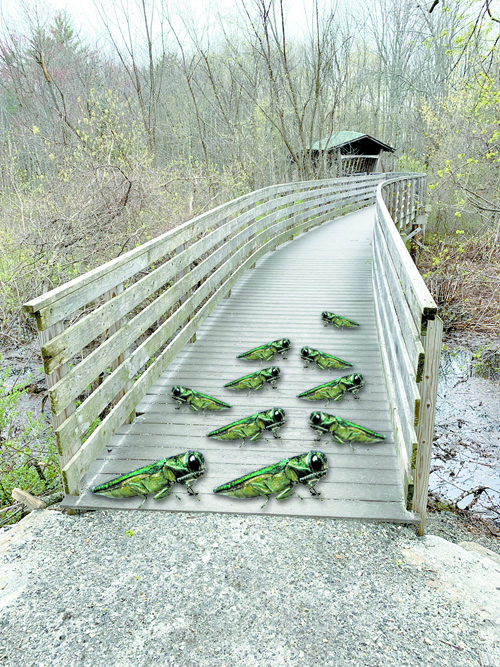‘Biological control’ suggested to fight Emerald Ash Borer attack in Pondicherry Park

By Wayne E. Rivet
Staff Writer
An unwanted pest is threatening the health and future of ash trees in Bridgton’s popular Pondicherry Park.
The Emerald Ash Borer is here (discovered last year), and according to Maine Forest Service entomologist Colleen Teerling, the small green beetle could decimate the park’s ash population unless immediate action is taken.
“Some (ash trees) will hang on, the ones that are less susceptible. You’re not likely to save the big trees, (but through bio control) the next generation (smaller trees that are currently 5 to 6 inches in diameter) will likely be saved and in the aftermath, the forest will be protected,” Teerling said. “Without any intervention, the ash trees will likely die.”
Teerling spoke to the Bridgton Select Board, along with Loon Echo Land Trust Executive Director Matt Markot and Development & Outreach Manager Maggie Lynn via a Zoom conference call Monday.
Native to Asia, the Emerald Ash Borer (EAB) was first detected in 2002 in Michigan, and has since moved on to 29 other states, leaving a path of destruction to the tune of killing tens of millions of ash trees. The EAB larvae feed on vascular tissues under the bark, interrupting the flow of nutrients and water and effectively starving infected trees.
One way to battle EABs is using a biological control measure — meaning the release of a parasitoid which is “the size of a period at the end of a sentence,” Teerling said, that dines on EAB eggs or larvae.
“The parasitoids spread and only attack EAB,” Teerling said. “If they get rid of EABs, the parasites then will die. It’s not likely to happen that all EABs will be gone, but the EAB numbers will be reduced to a low enough level that younger trees will survive. I don’t see a downside. They (the parasitoids) won’t become a pest. They are so specific as to what they feed on, EABs.”
Selectman Ken Murphy asked where the parasitoids come from?
Teerling said the parasitoids are produced at the USDA Biological Control Production Facility in Brighton, Mich. Teerling said the bio-control measure will be used in six York county towns and one Cumberland County town this coming season. She noted that the use of parasitoids has occurred in New Hampshire for several years, while the practice has been followed in other states for the past 8 to 9 years.
“It’s relatively new in Maine because EABs are relatively new in Maine,” Teerling said.
The measure has been used in parks, private woodlots and forests adjacent to residential areas.
Selectman Bob McHatton asked if there were any potential side effects using a parasitoid to combat EABs?
“Any time you release a new species into the environment, something unexpected could happen. Before anything is released, it is tested rigorously whether it might attack other species. If so, we won’t consider it. It’s been tested. If it (parasitoids) attack another specie, it’s close to EABs. That’s the worst possible happening,” Teerling said. “I don’t see any possible negative effects. They (parasitoids) live short lives, searching for EAB larvae. They’ll be under the bark and never seen.”
Shane Duigan, who works for Forest Service and resides in Bridgton, concurred, “You would never know they’re there, they’re so tiny.”
When asked how many ash trees are at risk, Teerling said those infested will likely last four to five years. The goal is to protect female trees, which provide seedlings for the next generation of ash growth in the park. A pesticide injection to these trees could help save “some of these iconic trees.” A dense area of ash trees is closer to Willett Road.
There would be no cost to the town to take on this bio-control measure, Lynn said. Loon Echo would work with the Forest Service in implementing the program.
Town officials supported the idea, but asked Teerling and Lynn to outline the plan on paper so they would possess an official record.
“It’s a major thing we’re doing and hopefully it works,” Town Manager Bob Peabody said.
Teerling said the plan calls for a two years of parasitoid releases and then two years of monitoring. If the town is interested in moving forward with this measure, approval would be needed soon since the facility ships insects in late May or early June.
Teerling plans to e-mail documentation to Peabody by the end of this week so the Select Board can vote on the proposal at this coming Tuesday’s meeting, May 9.

